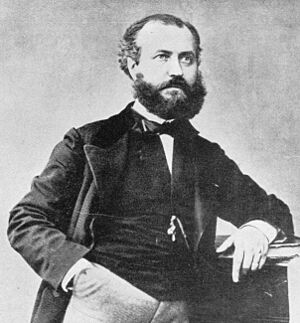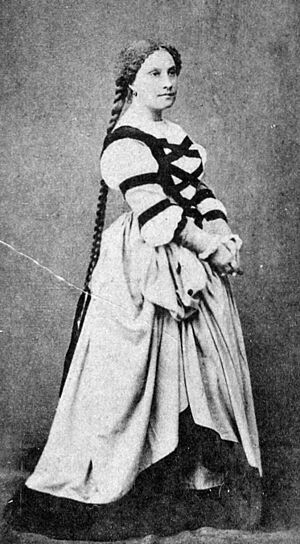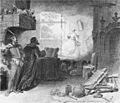Faust (opera) facts for kids
Faust is a famous grand opera with five acts. An opera is like a play where the story is told through singing. The music for Faust was written by Charles Gounod. The story, called the libretto, was written in French by Jules Barbier and Michel Carré. They based it on a play by Carré, which was inspired by a famous German book called Faust by Johann Wolfgang von Goethe.
The opera was first shown in Paris on March 19, 1859. People really liked it, and it became Gounod's biggest success. Faust was one of the most popular operas in the 1800s. It was even the first opera ever performed at the Metropolitan Opera in New York City in October 1883.
Performing Faust can be very expensive. It needs many singers, actors, and lots of different sets and costumes. Because of this, it's not performed as often as it used to be, especially since the 1950s. However, you might still see references to Faust in movies or other media. For example, it's the opera being performed in the 1925 silent movie The Phantom of the Opera. Even with its high cost, Faust is still performed around the world today.
Contents
Main Characters
These are the main characters in the opera Faust:
- Doctor Faust - A very old scholar (a person who studies a lot). He is sung by a tenor (a high male voice).
- Marguerite - A beautiful young woman. She is sung by a soprano (a high female voice).
- Méphistophélès - The Devil, who makes a deal with Faust. He is sung by a bass (a very low male voice).
- Valentin - Marguerite's brother and a soldier. He is sung by a baritone (a medium male voice).
- Siebel - Faust's student, who secretly loves Marguerite. She is sung by a mezzo-soprano (a medium female voice).
- Dame Marthe - Marguerite's neighbor and guardian. She is also sung by a mezzo-soprano.
- Wagner - Faust's friend. He is sung by a baritone.
- There are also many other characters like soldiers, students, demons, and angels in the choir.
The Story of Faust
The story of Faust takes place in Germany during the 1500s.
Act 1: The Deal with the Devil
Doctor Faust is an old scholar who feels like his life has been wasted on studies. He hasn't found happiness or love. He tries to end his life with poison, but he stops when he hears a choir singing. He then curses science and faith and calls out to Satan.
Suddenly, Méphistophélès (the Devil) appears. He shows Faust a magical vision of the beautiful Marguerite. Méphistophélès offers Faust a deal: he will serve Faust on earth, and in return, Faust will serve him in Hell. Faust agrees, and his cup of poison magically turns into a special drink that makes him young again. The old doctor becomes a handsome young man, and they both leave to explore the world.
Act 2: Meeting Marguerite
Outside the city gates, students, soldiers, and villagers are singing and having fun. Valentin, Marguerite's brother, is about to leave for war. He asks his young friend Siébel to look after his sister, Marguerite.
Méphistophélès arrives and offers everyone wine. He sings a lively song about the Golden Calf, which is a bit rude. He then says mean things about Marguerite. Valentin gets angry and tries to hit Méphistophélès with his sword, but the sword breaks. Valentin and his friends realize Méphistophélès is evil. They use the cross-shaped hilts of their swords to scare him away.
Faust joins Méphistophélès. The villagers start dancing a waltz. Marguerite appears, and Faust immediately tells her how much he admires her. She is too shy to walk with him and politely refuses.
Act 3: The Jewels and Love
In Marguerite's garden, Siébel, who is in love with Marguerite, leaves a bouquet of flowers for her. Faust sends Méphistophélès to find a special gift for Marguerite. Faust then sings a beautiful song, imagining Marguerite as a pure and lovely person.
Méphistophélès brings a fancy box filled with amazing jewelry and a hand mirror. He leaves it on Marguerite's doorstep next to Siébel's flowers. Marguerite comes in, thinking about her meeting with Faust. She sings a sad song about the King of Thulé.
Marthe, Marguerite's neighbor, sees the jewelry and thinks it must be from someone who likes Marguerite. Marguerite tries on the jewels and is amazed at how beautiful they make her look. She sings a very famous song called the Jewel Song.
Méphistophélès and Faust join the women in the garden. Faust and Marguerite fall in love. Marguerite lets Faust kiss her, but then she asks him to leave. Later, she sings at her window, hoping he will come back quickly. Faust, who is listening nearby, returns to her.
Act 4: Sadness and Betrayal
After Faust leaves her, Marguerite has a baby and becomes an outcast in her town. She sings a sad song while at her spinning wheel, wishing Faust would return. Siébel stays by her side to support her.
The scene then moves to the town square. Valentin's soldier company returns from the war, marching proudly. Siébel asks Valentin to forgive Marguerite. Valentin rushes to her house. While he is inside, Faust and Méphistophélès appear. Méphistophélès, thinking only Marguerite is there, sings a teasing song outside her window.
Valentin comes out of the house. The three men fight. Méphistophélès helps Faust, allowing Faust to fatally wound Valentin. With his last breath, Valentin blames Marguerite for his death and curses her in front of everyone.
Marguerite goes to church to pray, but Méphistophélès and a choir of devils stop her. She finishes her prayer but faints when Méphistophélès curses her again.
Act 5: Judgment and Salvation
Méphistophélès takes Faust to the Harz Mountains on Walpurgis Night, where they are surrounded by witches. Faust is then taken to a cave where he sees visions of famous queens. Méphistophélès promises Faust the love of the most beautiful women in history. There is a wild party with dancing.
As morning comes, Faust sees a vision of Marguerite and calls for her. Méphistophélès helps Faust enter the prison where Marguerite is being held for a sad event involving her child. Faust and Marguerite sing a love song together. Méphistophélès says that only a human can save Marguerite from her terrible fate. Faust offers to rescue her from the hangman. However, Marguerite chooses to trust in God and His angels instead.
At the end, Marguerite asks why Faust's hands are covered in blood. She pushes him away and falls motionless. Méphistophélès curses, but a voice from above sings, "Saved!" The bells of Easter ring, and a choir of angels sings, "Christ is risen!" The prison walls open, and Marguerite's soul rises to heaven. Faust watches in despair, falling to his knees to pray. Méphistophélès is turned away by the shining sword of an archangel.
Images for kids
-
The vision of Marguerite as staged at Covent Garden in 1864 with Jean-Baptiste Faure as Méphistophélès and Giovanni Mario as Faust
See also
 In Spanish: Fausto (ópera) para niños
In Spanish: Fausto (ópera) para niños
 | Delilah Pierce |
 | Gordon Parks |
 | Augusta Savage |
 | Charles Ethan Porter |








